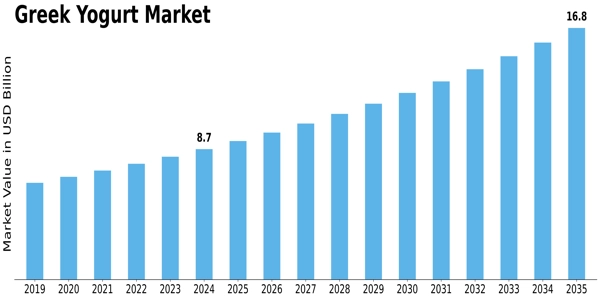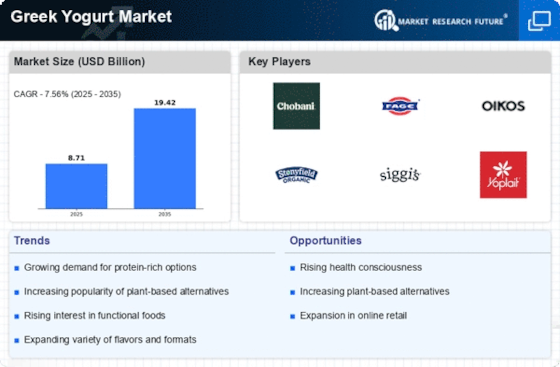-
'TABLE OF CONTENTS
-
Market Attractiveness Analysis
- Global Greek Yogurt Market, by Flavor
- Global Greek Yogurt Market, by Category
- Global Greek Yogurt
-
Market, by Distribution Channel
-
Global Greek Yogurt Market, by Region
-
Definition
-
Scope of the Study
-
Market Structure
-
Key Buying Criteria
-
Macro Factor Indicator Analysis
-
Research Process
-
Primary Research
-
Secondary Research
-
Market Size Estimation
-
Forecast Model
-
List of Assumptions
-
Introduction
-
Drivers
-
Restraints
-
Opportunities
-
Challenges
-
Value Chain Analysis
-
Supply Chain Analysis
-
Porter’s Five Forces Model
-
Bargaining Power of Suppliers
-
Bargaining Power of Buyers
- Threat of New Entrants
- Threat of Substitutes
- Intensity of Rivalry
-
Introduction
-
Unflavored
- Unflavored: Market
-
Estimates & Forecast, by Region/Country, 2024-2032
-
Vanilla
- Vanilla: Market Estimates & Forecast, by Region/Country, 2024-2032
-
Strawberry
- Strawberry: Market Estimates & Forecast, by Region/Country
-
Blueberry
-
Blueberry: Market Estimates & Forecast, by Region/Country, 2024-2032
-
Raspberry
- Raspberry: Market
-
Estimates & Forecast, by Region/Country, 2024-2032
-
Blends
- Blends: Market Estimates & Forecast, by Region/Country, 2024-2032
-
Others
- Others: Market Estimates & Forecast, by Region/Country
-
GLOBAL GREEK YOGURT MARKET, BY CATEGORY
-
Introduction
-
Organic
- Organic: Market Estimates & Forecast, by Region/Country, 2024-2032
-
Conventional
- Conventional: Market Estimates & Forecast, by Region/Country
-
GLOBAL GREEK YOGURT MARKET, BY DISTRIBUTION CHANNEL
-
Introduction
-
Store based
- Store based: Market Estimates & Forecast, by Region/Country, 2024-2032
- Supermarkets & Hypermarkets
-
Estimates & Forecast, by Region/Country, 2024-2032
-
Convenience Stores
- Convenience Stores: Market Estimates
-
Forecast, by Region/Country, 2024-2032
-
Others
- Others: Market Estimates & Forecast, by Region/Country
-
Non-store based
-
Non-store based: Market Estimates & Forecast, by Region/Country, 2024-2032
-
Introduction
-
North America
-
Market Estimates & Forecast, by Flavor, 2024-2032
-
Market Estimates & Forecast, by Category
-
Market Estimates & Forecast, by Distribution Channel, 2024-2032
-
Market Estimates
-
Forecast, by Country, 2024-2032
-
US
-
Market Estimates & Forecast, by Flavor, 2024-2032
-
Market Estimates & Forecast, by Category
-
Market Estimates & Forecast, by Distribution Channel, 2024-2032
-
Canada
- Market Estimates
-
Forecast, by Flavor, 2024-2032
-
Market Estimates & Forecast, by Category, 2024-2032
- Market Estimates
-
& Forecast, by Distribution Channel, 2024-2032
-
Mexico
- Market Estimates & Forecast, by Flavor
-
Market Estimates & Forecast, by Category, 2024-2032
-
Market Estimates & Forecast, by Distribution Channel, 2024-2032
-
Europe
-
Market Estimates & Forecast, by Flavor, 2024-2032
-
Market Estimates & Forecast, by Category
-
Market Estimates & Forecast, by Distribution Channel, 2024-2032
-
Market Estimates
-
Forecast, by Country, 2024-2032
-
Germany
- Market Estimates & Forecast, by Flavor, 2024-2032
-
& Forecast, by Category, 2024-2032
-
Market Estimates & Forecast, by Distribution Channel, 2024-2032
- UK
-
Market Estimates & Forecast, by Flavor, 2024-2032
-
Market Estimates & Forecast, by Category
-
Market Estimates & Forecast, by Distribution Channel, 2024-2032
-
France
- Market Estimates
-
Forecast, by Flavor, 2024-2032
-
Market Estimates & Forecast, by Category, 2024-2032
- Market Estimates
-
& Forecast, by Distribution Channel, 2024-2032
-
Spain
- Market Estimates & Forecast, by Flavor
-
Market Estimates & Forecast, by Category, 2024-2032
-
Market Estimates & Forecast, by Distribution Channel, 2024-2032
- Italy
-
Market Estimates & Forecast, by Flavor, 2024-2032
-
Market Estimates & Forecast, by Category
-
Market Estimates & Forecast, by Distribution Channel, 2024-2032
-
Rest of Europe
- Market Estimates
-
& Forecast, by Flavor, 2024-2032
-
Market Estimates & Forecast, by Category
-
Market Estimates & Forecast, by Distribution Channel, 2024-2032
-
Asia-Pacific
- Market Estimates
-
Forecast, by Flavor, 2024-2032
-
Market Estimates & Forecast, by Category, 2024-2032
- Market Estimates
-
& Forecast, by Distribution Channel, 2024-2032
-
Market Estimates & Forecast, by Country
- China
-
Market Estimates & Forecast, by Flavor, 2024-2032
-
Market Estimates & Forecast, by Category
-
Market Estimates & Forecast, by Distribution Channel, 2024-2032
-
Japan
- Market Estimates
-
Forecast, by Flavor, 2024-2032
-
Market Estimates & Forecast, by Category, 2024-2032
- Market Estimates
-
& Forecast, by Distribution Channel, 2024-2032
-
India
- Market Estimates & Forecast, by Flavor
-
Market Estimates & Forecast, by Category, 2024-2032
-
Market Estimates & Forecast, by Distribution Channel, 2024-2032
-
Australia & New Zealand
-
Market Estimates & Forecast, by Flavor, 2024-2032
- Market Estimates
-
& Forecast, by Category, 2024-2032
-
Market Estimates & Forecast, by Distribution Channel, 2024-2032
- Rest of Asia-Pacific
-
Market Estimates & Forecast, by Flavor, 2024-2032
-
Market Estimates & Forecast, by Category
-
Market Estimates & Forecast, by Distribution Channel, 2024-2032
-
Rest of the World
- Market Estimates
-
& Forecast, by Flavor, 2024-2032
-
Market Estimates & Forecast, by Category, 2024-2032
- Market Estimates
-
& Forecast, by Distribution Channel, 2024-2032
-
Market Estimates & Forecast, by Region
- South America
-
Market Estimates & Forecast, by Flavor, 2024-2032
-
Market Estimates & Forecast, by Category
-
Market Estimates & Forecast, by Distribution Channel, 2024-2032
-
Middle East
- Market Estimates
-
& Forecast, by Flavor, 2024-2032
-
Market Estimates & Forecast, by Category, 2024-2032
- Market Estimates
-
& Forecast, by Distribution Channel, 2024-2032
-
Africa
- Market Estimates & Forecast, by Flavor
-
Market Estimates & Forecast, by Category, 2024-2032
-
Market Estimates & Forecast, by Distribution Channel, 2024-2032
-
Introduction
-
Competitive Benchmarking
-
Development Share Analysis
-
Key Developments & Growth Strategies
-
Chobani LLC
- Company Overview
- Financial Overview
- Products Offered
- Key Developments
- SWOT Analysis
- Key Strategies
-
Danone S.A.
- Company Overview
- Financial Overview
- Products Offered
- Key Developments
- SWOT Analysis
- Key Strategies
-
Nestlé S.A.
- Company Overview
- Financial Overview
- Products Offered
- Key Developments
- SWOT Analysis
- Key Strategies
-
Stonyfield Farm, Inc
- Company Overview
- Financial Overview
- Products Offered
- Key Developments
- SWOT Analysis
- Key Strategies
-
FAGE USA Dairy Industry Inc.
-
Company Overview
- Financial Overview
- Products Offered
- Key Developments
- SWOT Analysis
- Key Strategies
-
General Mills, Inc.
- Company Overview
- Financial Overview
- Products Offered
- Key Developments
- SWOT Analysis
- Key Strategies
-
Byrne Hallow Farm
- Company Overview
- Financial Overview
- Products Offered
- Key Developments
- SWOT Analysis
- Key Strategies
-
Jalna Dairy Foods Pty Ltd.
- Company Overview
- Financial Overview
- Products Offered
- Key Developments
- SWOT Analysis
- Key Strategies
-
Erhmann AG
- Company Overview
- Financial Overview
- Products Offered
- Key Developments
- SWOT Analysis
- Key Strategies
-
Sun Valley Dairy
- Company Overview
- Financial Overview
- Products Offered
- Key Developments
- SWOT Analysis
- Key Strategies
-
General Sources &References
-
-
Greek Yogurt Market, by Region, 2024-2032 (USD Million) (USD Million)
-
by Distribution Channel, 2024-2032 (USD Million)
-
2024-2032 (USD Million) Million)
-
Greek Yogurt Market, by Distribution Channel, 2024-2032 (USD Million)
-
Market, by Flavor, 2024-2032 (USD Million) (USD Million)
-
Yogurt Market, by Flavor, 2024-2032 (USD Million)
-
2024-2032 (USD Million) (USD Million)
-
Market, by Category, 2024-2032 (USD Million)
-
Channel, 2024-2032 (USD Million)
-
Yogurt Market, by Flavor, 2024-2032 (USD Million)
-
2024-2032 (USD Million) (USD Million)
-
Market, by Category, 2024-2032 (USD Million)
-
Channel, 2024-2032 (USD Million)
-
Yogurt Market, by Category, 2024-2032 (USD Million)
-
Channel, 2024-2032 (USD Million)
-
Yogurt Market, by Category, 2024-2032 (USD Million)
-
Channel, 2024-2032 (USD Million)
-
Yogurt Market, by Category, 2024-2032 (USD Million)
-
Channel, 2024-2032 (USD Million)
-
Market, by Category, 2024-2032 (USD Million)
-
Channel, 2024-2032 (USD Million) (USD Million)
-
Greek Yogurt Market, by Distribution Channel, 2024-2032 (USD Million)
-
Greek Yogurt Market, by Country, 2024-2032 (USD Million)
-
2024-2032 (USD Million) (USD Million)
-
Yogurt Market, by Flavor, 2024-2032 (USD Million)
-
2024-2032 (USD Million) (USD Million)
-
Market, by Category, 2024-2032 (USD Million)
-
Channel, 2024-2032 (USD Million)
-
Yogurt Market, by Category, 2024-2032 (USD Million)
-
Channel, 2024-2032 (USD Million) (USD Million)
-
Greek Yogurt Market, by Distribution Channel, 2024-2032 (USD Million)
-
World (RoW): Greek Yogurt Market, by Country, 2024-2032 (USD Million)
-
World (RoW): Greek Yogurt Market, by Flavor, 2024-2032 (USD Million)
-
Greek Yogurt Market, by Category, 2024-2032 (USD Million)
-
by Distribution Channel, 2024-2032 (USD Million)
-
2024-2032 (USD Million) (USD Million)
-
Greek Yogurt Market, by Flavor, 2024-2032 (USD Million)
-
2024-2032 (USD Million)
-
2024-2032 (USD Million)
-
Yogurt Market, by Category, 2024-2032 (USD Million)
-
Channel, 2024-2032 (USD Million) Methodology
-
Global Greek Yogurt Market in 2023, by Country (%)
-
Yogurt Market Size, by Flavor, 2023
-
2024-2032 (%)
-
, by Category, 2024-2032 (%)






Leave a Comment